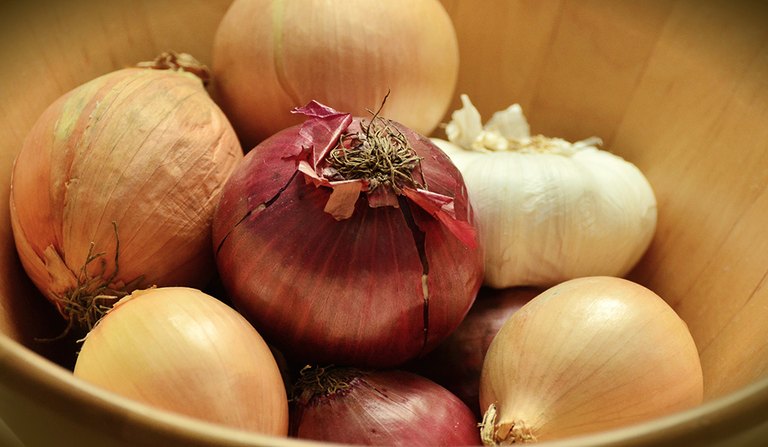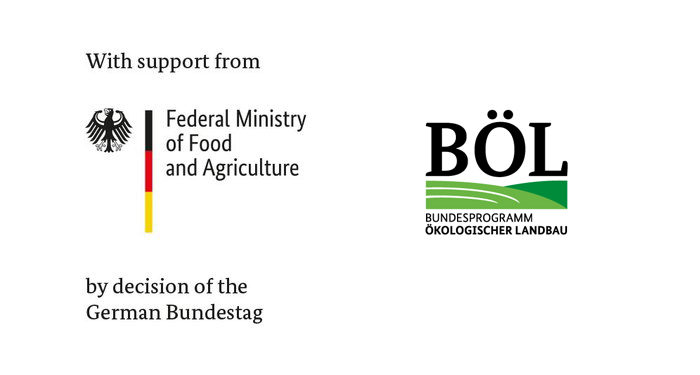Onion landraces for organic farming
Due to its unique taste and scent, the common onion (Allium cepa L.) is the second most widely cultivated vegetable globally after the tomato. In Germany, onions are similarly popular. Onion bulbs contain high levels of plant secondary metabolites and fructans which are associated with health-promoting effects.
As with other vegetables, the demand for organically produced onions is constantly rising and this demand should be met by regionally produced crops. In this regard, one major obstacle is the limited availability of suitable onion cultivars and organic seeds. But why is this the case?
Many different onion cultivars exist but only a limited selection is available in food retail markets. The reason: In conventional onion farming, which still dominates in Germany, a few so-called hybrid cultivars are used almost exclusively.
Hybrids in general are especially adapted to conventional farming and achieve, under these conditions, high yields. However, hybrids most usually are non-reproductive, which means that farmers have to buy the seeds every year. The massive use of hybrids has increasingly been criticised because this practice causes a displacement of other cultivars and threatens biodiversity. Apart from that, it has been reported that vegetables from hybrid cultivars may have a lower nutritional value and are often less tasty.
In contrast to the modern hybrid cultivars, the so-called landraces have been established by peasant breeding over hundreds of years. Landraces are open-pollinated, genetically diverse cultivars which are usually of regional origin. The large palette of landraces opens the possibility for the selection of cultivars with an optimal adaptation to different growing sites or regions including their further optimisation by means of organic breeding programmes. In addition, landraces often provide a diverse and cultivar-specific profile of constituents. This not only makes them interesting for bioeconomic purposes but also gives them attractive sensory properties: Bulbs of onion landraces cover the full range from very mild and sweet to extremely spicy, which meets different consumer preferences.
Against this background, landraces are of special interest for organic farming because here the so-called site adaptation plays a larger role: it is especially important to use cultivars that are adapted to the conditions of the respective growing area (soil properties, crop rotation, climate, rainfall, etc.). According to current German and EU regulations, hybrids as well as CMS hybrids are allowed and indeed used in organic farming, but they are not well adapted to this type of agriculture. Also, hybrids are generally not desired in organic farming for various reasons and particularly the use of CMS hybrids has been prohibited by several organic farming associations. In recent decades, conventional breeding programmes have primarily focused on hybrid cultivars while the development of improved cultivars for organic farming has been largely ignored. As a consequence, there is currently a substantial lack of cultivars that can effectively be used for organic farming.
For several years, the Max Rubner-Institut as the Federal Research Institute of Nutrition and Food has been investigating the quality aspects of landraces. Within the scope of a pilot study, in cooperation with the University of Hohenheim (group of Prof. Zörb, Institute of Crop Science, Division Quality of Plant Products), the MRI’s Department of Safety and Quality of Fruit and Vegetables has already assessed the suitability of several landraces for the use in organic farming as well as the storability of the bulbs.
The ZwiebÖL project aims at directly comparing the suitability of landraces and hybrids for organic farming. Core of the projects are field trials at two different sites in two subsequent years (2020/2021) under organic farming conditions with 4-6 cultivars each (landraces and hybrids).
Yield and quality parameters, the sensory properties, the microbiological quality as well as the storability of the bulbs will be determined. Further, the alleged positive effect of the so-called condensation drying – a procedure which enables a much faster curing of the bulbs compared to conventional curing in barns – on bulb storability will be evaluated. Fresh as well as stored bulbs will be analysed comprehensively to characterise the cultivar-specific profiles of volatile and non-volatile onion constituents including their storage-related changes. For this, especially untargeted GC-MS, GCGC-MS und LC-MS platforms will be used. In parallel to the field trials, a survey will be performed to describe the current state of onion cultivation in Germany. A specific aim here is to find out which onion cultivars are typically grown in different German growing regions in the conventional as well as the organic sector. Finally, in collaboration with the farming associations, the results will be communicated to the farmers in order to put the acquired knowledge into practice.
The ZwiebÖL project contributes to the implementation of the Strategy for the Future of Organic Farming of the German Federal Ministry of Food and Agriculture (BMEL). The project is funded by the BMEL according to a decision of the German Bundestag within the scope of the Federal Scheme for Organic Farming and Other Forms of Sustainable Agriculture (BÖLN, funding code 2819OE019).
Scientific publication(s)
- Romo-Pérez, M. L., Weinert, C. H., Häußler, M., Egert, B., Frechen, M. A., Trierweiler, B., Kulling, S. E., Zörb, C. (2020). "Metabolite profiling of onion landraces and the cold storage effect." Plant Physiology and Biochemistry 146: 428-437. (https://doi.org/10.1016/j.plaphy.2019.11.007)
- Romo Pérez, M. L., et al. (2018). "Quality aspects in open-pollinated onion varieties from Western Europe." Journal of Applied Botany and Food Quality 91: 69–78. (https://ojs.openagrar.de/index.php/JABFQ/article/view/8535)
- M. L. Romo-Pérez, C. H. Weinert, B. Egert, B. L. Franzisky, S. E. Kulling and C. Zörb, Sodium accumulation has minimal effect on metabolite profile of onion bulbs. Plant Physiology and Biochemistry 2021 Vol. 168 Pages 423-431. (https://doi.org/10.1016/j.plaphy.2021.10.031)



